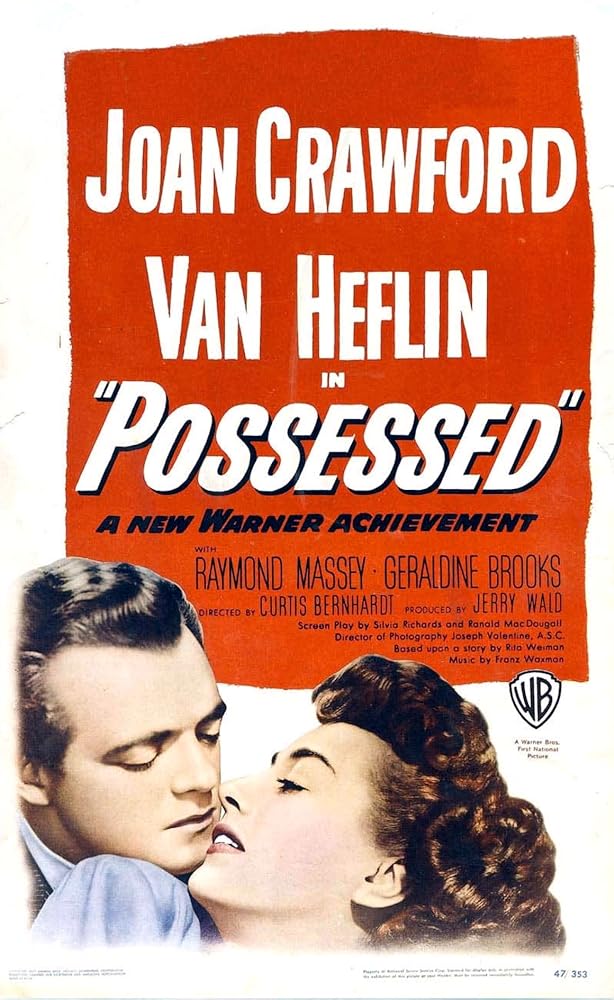
POSSESSED
(director: Curtis Bernhardt; screenwriters: Ranald MacDougall/Lawrence Menkin/from Cosmopolitan magazine story One Man’s Secret by Rita Weiman; cinematographer: Joseph A. Valentine; editor: Rudi Fehr; music: Franz Waxman; cast: Joan Crawford (Louise Howell Graham), Van Heflin (David Sutton), Raymond Massey (Dean Graham), Geraldine Brooks (Carol Graham), Stanley Ridges (Dr. Harvey Williard), John Ridgely (Lt. Harker), Gerald Perreau-Saissine (Wynn Graham); Runtime: 108; MPAA Rating: NR; producer: Jerry Wald; Warner Bros.; 1947)
“Joan’s acting was overstuffed.”
Reviewed by Dennis Schwartz
In German émigré director Curtis Bernhardt’s melodrama Possessed, Joan Crawford plays a mentally disturbed person who can’t distinguish reality from her imagination. Through use of German expressionism techniques and many familiar film noir shadowy shots, the b/w film takes on a penetrating psychological tone and makes a case for a not guilty of murder plea due to insanity. Though Joan has a powerful presence in this movie, she played her mad role in a too cold and campy way to be thought of as a sympathetic figure. All the psychological treatment therapy sounded like psycho-babble and Joan’s acting was overstuffed, though some of her morbid imaginations were gripping and held my attention.
A dazed Louise Howell (Joan Crawford) roams the downtown streets of Los Angeles in search of “David.” While in a trance-like state in a restaurant, Louise calls out again for David and is rushed to a hospital. The emergency room doctor diagnoses her as being in a non-traumatic stupor and she’s sent to the psychopathic ward, where she’s treated by the efficient and kindly Dr. Williard (Stanley Ridges) with drugs so that she recalls the events that brought her there. At that point the film goes into flashback, and the scene is set in Washington, D.C. where the thirtysomething Louise is madly in love with a 35-year-old bachelor construction engineer and amateur classical pianist David Sutton (Van Heflin). The trouble is he doesn’t love her and finds her possessive and overbearing, but she’s so obsessed with him she can’t let go.
As a coincidence, David shows up later at the house of her wealthy oil company owner employer Dean Graham (Raymond Massey) and asks for a job on a project in Canada. Louise is the home nurse taking care of the invalid and mentally disturbed and jealous wife named Pauline. The wife has a dislike for Louise and falsly accuses her of having an affair with her husband, which is only in her mind. Pauline’s mental condition causes her to commit suicide in a lake by drowning. At the inquest, which rules the death as accidental, Dean’s two children return from school. The 20-year-old daughter Carol (Geraldine Brooks) hates Louise with a passion based on the jealous letters her mother wrote. The young son Wynn disappears from the tale and we never learn what he thinks.
Warning: spoiler to follow.
Meanwhile the much older and lonely Dean has fallen in love with Louise and asks her to marry him, even when she says she doesn’t love him. Louise marries him for many complicated reasons, but before she does she visits Carol in her school and makes peace with her. At the wedding reception Carol and David show a fondness for each other, which drives her psychosis into dangerous territory. Louise begins imagining that she killed Pauline and that she killed Carol in a jealous rage. She sees a doctor on the sly, who tells her she’s a schizoid and should be treated but she doesn’t listen to his warnings about the seriousness of her mental condition. Dean becomes aware of her problem and offers his love and support. But things become too much when Louise learns that Carol and David are about to tie the knot and through poisonous means she still can’t break them up even if she’s sure he’s after the girl’s money. When Louise shoots him dead, this brings on the catatonic state she was in when the film opened.
REVIEWED ON 12/20/2003 GRADE: B-